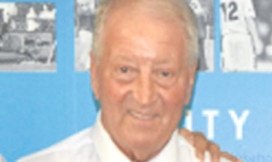
A Scots ex-footballer who emigrated to Australia and became a teacher has unwittingly been thrust to the centre of a political storm.
Hugh Murney, 75, who played for Greenock Morton and Dumbarton in the 1950s and ’60s, was name-checked by one of Australia’s top education experts during a debate about corporal punishment.
Dr Kevin Donnelly, co-chairman of the Australian Government’s national curriculum review, said his former teacher would deal with problem pupils by taking them behind the bike shed and threatening to punch them.
He claimed the threat of physical punishment was “very effective” and that is why he is in favour of bringing the belt back to Australian schools.
The admission caused outrage among teachers and health experts. But Hugh denies he threatened to punch pupils.
He said: “I told him, ‘If you don’t pull your head in and don’t do as I ask, you will be in big trouble with me’. I just gave him strong words. But there were no threats to punch.”
Hugh admitted giving pupils “a tap” if they were out of line.
He said: “If the boys got changed in the wrong clothing or something, they would get what they call a cut it was just a tap. But I don’t think in modern days that this would be a good idea, everything has completely changed.
“I think children are cheekier these days, but the strap is not the answer.”
It was in an interview with a radio station on Tuesday that Dr Donnelly said he had no problem with the use of corporal punishment in schools if it is supported by the local community. He then chose to reflect on his own school days in 1966, referencing his old Scottish PE master.
He said: I grew up in a housing estate in Melbourne, and we had a Scottish phys-ed teacher. Whenever there were any discipline problems he would actually take the boy behind the shed and say, ‘We can either talk about this or you can throw the first punch.’
“That teacher would probably lose his job now but it was very effective. He only had to do it once and the kids were pretty well behaved for the rest of the year.”
In the wake of the comments, Hugh was hunted down by national press. He was able to remember Dr Donnelly from his school days, describing him as “a very nice young fellow, a good boy very friendly.”
Hugh emigrated to Australia in 1964 to play for Melbourne Hakoah before taking a job as a PE teacher. He’s now retired, but still coaches football.

Enjoy the convenience of having The Sunday Post delivered as a digital ePaper straight to your smartphone, tablet or computer.
Subscribe for only £5.49 a month and enjoy all the benefits of the printed paper as a digital replica.
Subscribe